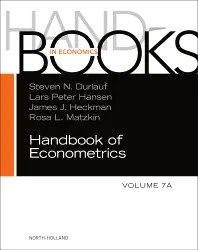Handbooks in Economics
Aim & scope
The Handbooks in Economics series provides the various branches of economics with definitive reference sources, suitable for use by professional researchers, advanced graduate students, or by those seeking a teaching supplement. With contributions from leading researchers in the field, each volume presents an authoritative, self-contained survey of the topic under examination. With over 110 volumes in the collection, the handbooks are more highly cited than any other economics journal.
The Handbook in Economics series was founded in 1983 by Kenneth Arrow and Michael Intriligator with the aim of helping economists understand increasingly complex fields and as the series gained popularity and citations, Kenneth and Michael started new subseries to cover all the core subjects in economics. Between 1991 and 2010 the series established one or two new subseries each year, managing to balance quality of content with the increasing demand for a wider view of the vast array of topics in the field of economics. The Handbooks in Economics play a unique role in collecting, organising, analysing and synthesizing advances in economic research for graduate students and professionals.
Current Series Editors Rosa Matzkin, Steven Durlauf and Sanjeev Goyal recognize the same balance between quality scholarship and the need for increasing scope that Kenneth and Michael embraced. As Kenneth and Michael put it themselves: The aim of the Handbooks in Economics series is to produce Handbooks for various branches of economics, each of which is a definitive source, reference, and teaching supplement for use by professional researchers and advanced graduate students. Each Handbook provides self-contained surveys of the current state of a branch of economics in the form of chapters prepared by leading specialists on various aspects of this branch of economics. These surveys summarize not only received results but also newer developments, from recent journal articles and discussion papers. Some original material is also included, but the main goal is to provide comprehensive and accessible surveys. The Handbooks are intended to provide not only useful reference volumes for professional collections but also possible supplementary readings for advanced courses for graduate students in economics.
One of the greatest assets of Handbook in Economics is the ability to establish new subseries that features recognized experts. Now numbering over 120 volumes, they offer important entry points to key literature, have long shelf lives, and are highly cited. Its signature characteristic is its ability to attract worldwide experts to summarize and judge the scholarship that defines their fields, and to-date over 38 Nobel Prize winners have contributed to volumes of Handbook in Economics, with almost every volume since 2000 containing a contribution from them. It is an essential series for graduate-level students, as well as professors and researchers who seek high-level summaries of recent advances in research literature in the fields of economics.

Publish a book with Elsevier
Editors
SD
Steven Durlauf
Steans Professor
Harris School of Public Policy Studies at the University of Chicago
Read more about Steven DurlaufSG
Sanjeev Goyal
Professor of Economics
Fellow of Christ's College, Cambridge
Read more about Sanjeev GoyalRLM
Rosa L. Matzkin
Professor of Economics
University of California – Los Angeles (UCLA
Read more about Rosa L. MatzkinIf you wish to discuss ideas or advances in economic research, for graduate students and professionals, which may be suitable for publishing within the Handbooks in Economics Series, please contact Jason Mitchell, Acquisitions Editor: [email protected] opens in new tab/window
Recent volumes

Handbook of Agricultural Economics, Volume 5 opens in new tab/window, 8th December 2021
Handbook of Industrial Organization, Volume 4 opens in new tab/window, 6th December 2021
Handbook of Industrial Organization, Volume 5 opens in new tab/window, 9th December 2021